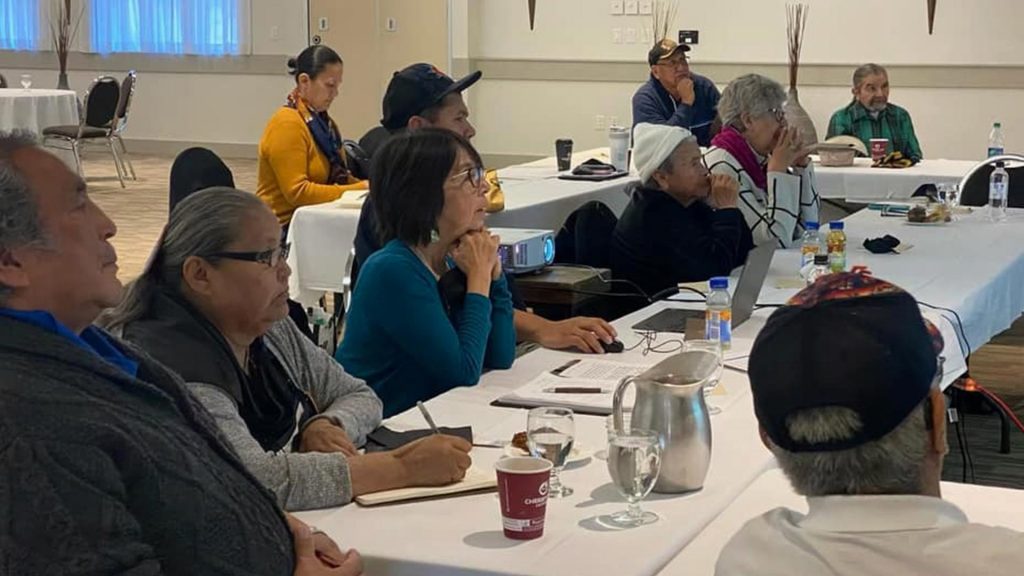
syilx Nation members are also developing a Family Declaration — 'one of our first steps in syilx law articulation,' says Lewis. Pictured at Family Declaration nqilxwcen on Oct. 31. Photo provided by ONA
The syilx Nation will present a new prevention-focused child and family plan for members to review Wednesday, during the Four Food Chiefs Gathering at the Penticton Trade and Convention Center.
“Colonization has really impacted our family and communities’ ability and system [of] looking after our children,” says Jennifer Lewis, wellness manager for the Okanagan Nation Alliance (ONA). “The resources that are out there do not support our Indigenous way of doing things.”
She says this new model is about standing up “the nation’s inherent jurisdiction regarding child and family supports.”
The focus will be on prevention through “holistic wraparound services,” rooted in sqilxwcawt (syilx’s cultural ways of being), she says. The plan “combines cultural teachings, traditions and captikwł [oral history] knowledge as described by our Elders, Knowledge Keepers, and cultural practitioners, as well as the voices of our Nation’s youth.”
“Integral aspects of this plan are the Four Food Chiefs’ perspectives, the enowkin’wixw circle process, and the philosophy of coming to this kind of helping work in a Good Way.”
Lewis has a bachelor’s degree in Indigenous social work. She says the model has been informed by engagement with the nation’s seven member communities — particularly Elder groups, youth groups, and grandmother groups — as well as historical documents.
“It is simply the latest part of one area of revitalization work, one link in a long chain of projects and endeavors to help our families heal from the devastating impacts of colonization … We raise our hands to our Elders and Knowledge Keepers, especially our Grandmothers, who have provided the wisdom, knowledge, and teachings that have made this planning work possible.”
Transferring power from the province to the people
All seven communities in the syilx Nation are currently under the jurisdiction of either B.C.’s Ministry of Children and Family Development (MCFD) or an agency delegated to serve Indigenous children and families by the province when it comes to child and family services, says Lewis.
Each community has a different relationship with MCFD, she says.
“Some of our communities have a stronger active relationship with MCFD. And some of our communities don’t … At times, we hear that there are more challenges … It depends on the workload and what’s going on for [MCFD].
“We do hear regularly that children are falling through the cracks in terms of how the ministry responds and supports.”
Right now, MCFD offers services like family support or crisis intervention support, says Lewis.
“In the new model, we are hoping to significantly enhance the community-based staffing model to … support families right in community … to develop community advisory groups or councils to make some of those decisions … Right now, not all communities have that.”
Transferring power from the province back to communities is “critical,” says Lewis. Right now the ministry “decides where funding goes for prevention,” and that should be up to the community, she says.
IndigiNews asked whether the syilx Nation plans to exercise jurisdiction under Bill C-92, an Act respecting First Nations, Inuit and Métis children, youth and families.
The Act came into force on Jan. 1, 2020 with an aim “to reduce the number of Indigenous children and youth in care and improve child and family services.” Indigenous children are grossly overrepresented in B.C.’s child-welfare system due to colonial policies and systemic racism.
“Our nation’s leadership is looking at the different opportunities and options for implementing the support,” Lewis says.
Under the Act, there are two federally-sanctioned options for Indigenous governing bodies to exercise their jurisdiction over child and family services, as previously reported by IndigiNews.
They can either request a “tripartite coordination agreement with Indigenous Services Canada and relevant provincial or territorial governments.” Or they can send notice to the minister of Indigenous services and relevant provincial or territorial governments of their intent to exercise jurisdiction. But in the latter case, the Indigenous governing body’s laws on child and family services would “not prevail over federal, provincial and territorial laws,” according to the federal government.
“Bill C-92 is limited in its ability. For sure it creates more space. But it’s also limited in its ability to ensure that we have all the funding resources that are required, as well as [the] authority that our people actually want,” Lewis says.
“There’s nothing stopping us in our own families, in our own communities, to do whatever we want to do. We have the authority. It’s whether we can access funding.
“We are and historically have been underfunded,” she says. “The idea is that we create the plan first, and then we go and decide what funding or legislative model we want to work with.”
Another barrier is the fact that families “still have to go to a Provincial Court.” We need our own justice system, she says.
“It’s not just about intervening in the protection of our children. It’s about rebuilding and respecting those family and community systems that protected our children and our families for time immemorial … It really has to be an integrated, holistic process based in our culture, our language … and our family and community responsibilities … That’s what our focus is.”
Editor’s note: We don’t use capital letters in nsyilxcən words. This is because, according to nsyilxcən language holders, capitalization insinuates that someone or something holds more importance than another, and this belief does not fall in line with syilx ethics.










